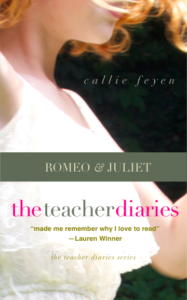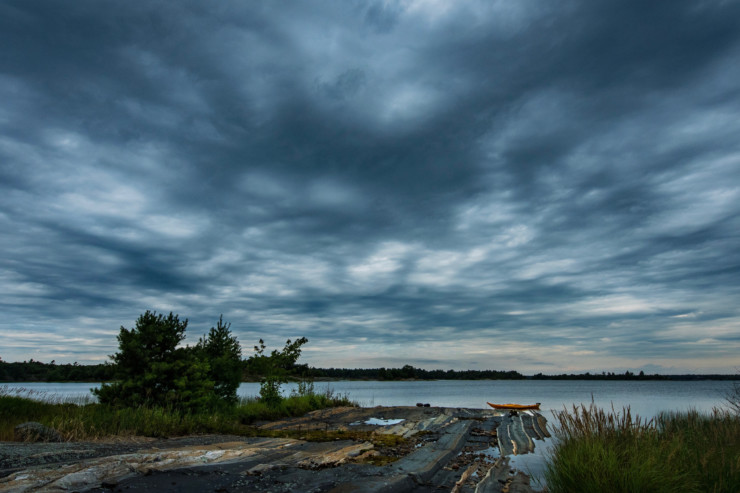I want to start on a gray December Sunday, on a highway in Michigan. Most of the trees are leafless, and those that remain on the branches are crusty brown and look as though they forgot to let go when the green drained from them. The corn fields have been plowed and all that’s left are knobby, manila-cracked stalks that the cows stomp on — their heads hang low considering what there is to do with what’s left of this year’s harvest.
Everything seems to be some sort of gray — the sky, the road, the tree trunks. I’m surprised by how many strands of gray there are. I’m surprised to I find what I see beautiful and hopeful, and since I don’t know what else to do, I share it with Jesse, who is driving us home.
“This is beautiful,” I tell him.
“The song?” he asks. The first strums of guitar and slides of a cello play from Iron and Wine’s “Belated Promise Ring.” I’ve insisted we all partake in Pandora’s Sufjan Steven’s Holiday station. The songs are a mix of traditional Christmas and holiday medleys, but several, like this one, make no mention of Christmas or snow or winter, and Jesse and I are amused that they sneaked into the rotation. Sometimes we’ll skip the songs, annoyed at their nerve to crash the party. Other times we’ll discuss a scenario in wintertime when the song would fit. We haven’t discussed the relevance of “Belated Promise Ring” to wintertime, but neither of us has declared its irrelevance either.
“Well, yes, the song is beautiful,” I confirm and turn the volume up. “I’m talking about outside.”
Jesse doesn’t agree, nor does he challenge my naming a gray day beautiful, but I watch as he scans the scene outside our car, and I’m satisfied because he is looking to find what I see.
“Sunday morning, my Rebecca sleeping in with me again
There’s a kid outside the church kicking a can
when the cedar branches twist she turns her collar to the wind
The weather can close the world within its hand.”
This is how Iron and Wine’s song begins, though Samuel Ervin Beam’s words are not what drew me in. It was the melody, a swooping, friendly set of notes that made me feel like I was sitting on a rickety but strong porch swing. There is a settling to the melody, as though Beam is inviting us to sit awhile. What he’ll share will be complicated. And like the gray Sunday afternoon driving on a midwestern highway, I’ll have to think about why this beauty is the sort I’d like to stay in for a while.
I believe this is the work — and play — of poetry. It is that gray Sunday afternoon we cannot stop looking at and wondering about. It is that melancholy song that whispers peace and faint joy into our hearts as we cry for the pain in the world. It does not ask us to understand; it invites us in.
We drive on, Jesse and I, holding hands, looking out into the world and listening to Beam’s song. I’d like to know more about the promise ring. I’d like to know more about Rebecca and that tree with the cedar branches. I’d like to sit with the sound of a kid kicking a can outside a church, and I feel there will be many days this December, January, and February when weather’s hand will close the world.
Try It
This month, as the daylight is snuffed out by the growing night, what poems keep you company? What phrases and stanzas invite you in? Which words help you see beauty in the gray? Share a poem that you love, or one that you wrote in the comments below.
Featured Poem
Thanks to everyone who participated in last week’s poetry prompt. Here’s one from Kimberly Knowle-Zeller that we enjoyed.
Because you’re learning to talk
Learning to name your world
Unexposed to the way things are supposed to be;
Everything that brings you joy
Begins with blue ball.
All my prayers
Lay on the blue ball
Learning to see the same joy.
—Kimberly Knowle-Zeller
Photo by michaelleckmaa Creative Commons, via Flickr. Post by Callie Feyen, author of The Teacher Diaries: Romeo and Juliet.

—JJN Mama, Amazon reviewer
- Poetry Prompt: Courage to Follow - July 24, 2023
- Poetry Prompt: Being a Pilgrim and a Martha Stewart Homemaker - July 10, 2023
- Poetry Prompt: Monarch Butterfly’s Wildflower - June 19, 2023

Sandra Heska King says
“It does not ask us to understand; it invites us in.”
That’s what I’ve learned about poetry over the last few years. It’s an invitation–and even a dare–to play and wonder and to find laughter and love–and even in pain to find peace. Whether I understand the original intent or not. And even if it’s just a word or a line that captures me.
Kimberly, your acrostic is so sweet. I think a blue ball will always make me smile now.
Dave Malone says
Love this post, Callie. “It is that gray Sunday afternoon we cannot stop looking at and wondering about.” No doubt.
Monica Sharman says
Here’s a poem I love which contains both despair and joy, I think.
“Piano,” by Paul Willis
The summer you were seven
you could hardly sleep
that night before your first recital.
“I’d rather break my arm,” you said.
Which is what you did with an hour
to spare. We could blame the dog
who chased you into the glass door,
but that would be dumb. A wish,
you found, is a dangerous thing.
Today, eight years old and nearly
Christmas, you asked to be the first
on the program. As you sat waiting,
sunlight fell on the bowl-cut line
behind your head. Sometimes
just a year is enough to learn
to bring joy to the world.
Dave Malone says
Great choice for December days. What a wonderful poem!
Richard Maxson says
The Muse in Winter
There is the Cardinal’s proclamation
through the solemn air,
bringing to life the ghost of winter.
You must be content with his cry and color,
and ice on holly berries near the window,
until the bells of crocus pry
the snow, and the wild iris
brings the memory of her eyes.
For now, there is only a naked fragrance
from fresh snow, a memory
fallen, recondite in crystal,
that holds the wine of inspiration.
Katie says
Here is a poem I came across just this weekend:
The Library
Barbara A. Huff
It looks like any building
When you pass it on the street,
Made of stone and glass and marble,
Made of iron and concrete.
But once inside you can ride
A camel or a train,
Visit Rome, Siam, or Nome,
Feel a hurricane,
Meet a king, learn to sing,
How to bake a pie,
Go to sea, plant a tree,
Find how airplanes fly,
Train a horse, and of course
Have all the dogs you’d like,
See the moon, a sandy dune,
Or catch a whopping pike.
Everything that books can bring
You’ll find inside those walls.
A world is there for you to share
When adventure calls.
You cannot tell its magic
By the way the building looks,
But there’s wonderment within it,
The wonderment of books.
*****
I cannot read this without smiling:)
Sherry Asbury says
I was very excited by your publication and your venue. I wanted to submit something for your consideration, but saw no place to do so.
I write compulsively, being a bedbound old woman, from DV and illnesses.
I have been Poet of the month on Poetry Superhighway. An upcoming poet at Poetry Soup, Family Friendly Poems featured me on their website and entered my poem in their Christmas contest. There are more, but old ladies tend to go on and on.
Katie says
Among our Christmas books is one called: A Season in Poems & Quilts, by Anna Grossnickle Hines.
The illustrations are brilliantly colored quilts portraying the poems.
I wanted to share this one with you.
Artist
Bright as a lightbulb,
round as pie,
the moon glows full
in the winter sky.
It’s high overhead,
but far below
the moon paints pictures
on the blue-white snow.
The illustration for this poem is a lovely bright moon-lit night with starry sky and moon light reflecting off the snowy ground. The children by their snowman are lifting their arms and hands as if to cheer on the moon, while their tall shadows slant downhill behind them!
Dave Malone says
This is really wonderful. So glad you shared this. Quilting (not poetry, lol) is a family tradition, and I learned how from my grandmother, so I’m very appreciative of anything quilt-y. 🙂 Love that it’s coupled with poetry. 🙂
Katie says
That’s so cool, Dave!
My sister in law, Margaret Brewster Willingham is a phenomenal quilter.
She has just co-authored (with Nan Baker) : Christmas RAPPing “Christmas Quilts featuring Reverse Applique & Paper Piecing.”
her website is http://eobquiltdesign.com/
They have gorgeous patterns for quilts, table runners, wall hangings, ornaments, . . .
Hope you will check it out and find something else quilty to love:)
Merry Christmas,
Katie
Dave Malone says
Hi, Katie,
Thanks for sharing Margaret’s website. Gorgeous pieces. I appreciated that she talked about the legacy of family heirlooms. I love that. One of my favorite Georgia O’Keefe quotes is: “To see takes time. Like to have a friend takes time.” It’s true of painting; it’s true of quilting, of writing. And Margaret is definitely taking the time to see. 🙂
Dave
Florence Brooks says
This is a poem I wrote a few years back…entitled “Watching”
The light has come.
The sun slowly rising into a canopy of blue casting its golden rays
on ancient cypress and native pine.
A heron stands at attention
waiting to salute the day.
A blackbird shouts a hearty welcome
stirring slumbering girls with its raucousness.
And I wait and watch for the light
to penetrate the darkness,
to reach places I cannot see,
yet I believe are here.
I wait and watch knowing
that light will come again.
Sherry Asbury says
Stirring poem that promises another day will come to be. Love the imagery of the birds and the children being roused. The ancients had no such assurance, bringing about many of their rituals of worship of the sun – even sacrificing so that the sun would appear.